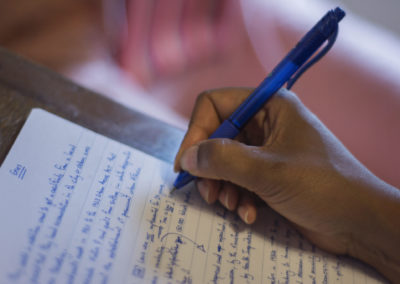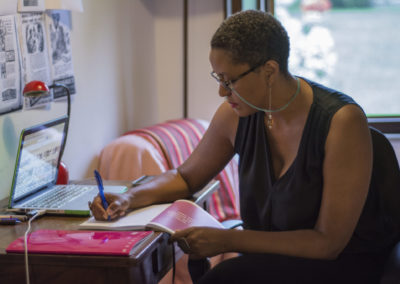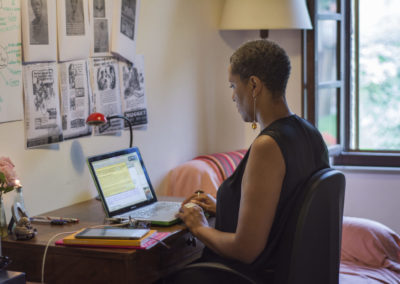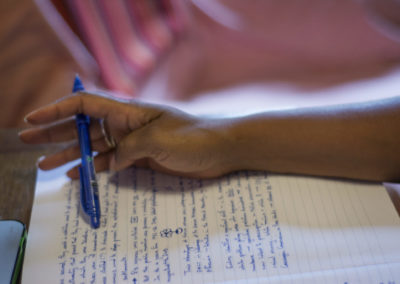Gail Smith
“I’m sorry, my darling, but it’s not good news,” said Dr Doolabh, gently tilting his head to the side, as if to cushion the blow, “it’s cancer.” Inside I felt a distinct crack and heard the unequivocal sound, heard only by me, of a tendon snapping. In time, I would come to realise that that was the sound of a silencing. Of a voice being lost.
Driving my mother home from her appointment at Garden City Clinic that October day, the optimism of a Joburg Spring purpled by the Jacaranda trees so beloved by our city’s founding fathers, was distinctly at odds with the wintry realisation that I had come face to face with my greatest fear: a world, a life, a me, without my mother.
Mother daughter relationships are invariably tortured; immense love enmeshed with a gamut of other competing emotions: resentment, irritation, thwarted expectations, amusement, pride, gratitude, exhaustion. Ours was no different. I am my mother’s daughter, from my cheekbones to my sharp tongue, my bulgy eyes to my capacity for cutting sarcasm.
I count myself among those who have been blessed to have been mothered well. Amidst the modest inventory of worldly goods bequeathed to me by my mother, my love of literature is the inheritance I most treasure. The literary gems of Aldous Huxley, William Shakespeare, and passages from the Old Testament, were just some of the sources of succour she imparted to help her children cope with the grinding downward pressure of life lived under the jackboots of apartheid. It was from my Mum that I learned to love books, that I discovered the transformative power of reading, and the irrefutable compulsion of writing.
From her that I first heard about her grandmother, Sophia Maria Human Sauls, who grew up as a slave to a Dutch family in the Cape, and eventually found work in a kitchen in the mining town that would one day become Johannesburg. This uneducated kitchen girl instilled in her daughter and granddaughter the non-negotiable commitment to educating their girls.
My mother was a storyteller. And her stories inspired an insatiable curiosity inside of me to know more. More about this slave called Sophia, and more about her life in a small mining town that would one day become the economic hub of a continent. More about her and other ‘Native’ women, so despised by the Colonial governments who sought by all means to keep them out of the ‘white man’s town’.
Spurred by my curiosity I began a book project on the lives of those early pioneers to Johannesburg. The millions of Native women who pilgrimaged to Johannesburg and other towns and cities of South Africa in spite of systematic and unrelenting legislative and social efforts by successive Colonial administrations to stop them. Who migrated in ones, and twos and threes between 1910 and 1940, and whose migration would rival the exodus of black Americans from the South in the first half of the 20th Century. A leaderless mass movement and escape from the arid ‘reserves’ left to them after a wholesale Colonial land grab made their rural existences a nightmare.
Unsurprisingly, little has been written about these women that provides any depth, colour, context, or individuation. They exist in official documents, parliamentary debates and old newspaper columns as the ‘dirty’, ‘drunken’, ‘immoral’, ‘disease ridden’ Native women of little utility to the ruling minority with a voracious appetite for the cheap labour of black men conscripted to labour in the gold reefs of Johannesburg and the diamond mines of Kimberley.
I spent months interviewing women born in the early 1900s whose mothers had migrated. I searched and scoured, to no avail, to find narratives that could ‘re-member’ these women; literally put back together a sense of time, space, community. My writer self often felt outraged by the lack of material, but I was also spurred by a dogged determination to tell their stories. I could no more silence the cacophony of voices inside of my head than I could stop myself from breathing.
My mother’s diagnosis with cancer in October 2009 did just that. And more. For the first time, since I wrote my first story aged 6, I found myself unable to write. I had lost my voice, unable even to journal, something I had done since I was 14 years old. My mother lost her battle with cancer in March 2010.
Silenced by grief, I spent much of the last four years mocked by the pile of papers, books, tapes and other research on women in Johannesburg I had collected over the years. Eighteen months ago resigned from my position as a senior specialist writer at a Sunday broadsheet and found a job that would not expose the raw wound this silencing inflicted on my soul. I mourned my mother. I mourned my writer self.
The power of grief to silence us, was one of the segues taken in a brief conversation I had with Ingrid Rowland after her awe-inspiring talk on Pompeii on my second day at Civitella. I went over to thank her for her talk as she finished lunch in Volte and in the course of chatting she mentioned the impact of her father’s dementia and death on her writing. It was the first inkling I had that I had indeed found myself among kindred spirits in Umbria.
I had arrived at Civitella laden with a staggering amount of research material for my book. Much of the pile that mocked me on my desk in Johannesburg compressed into one memory stick. Its size belied the enormity of task I had set myself: not just to wade through piles of legislation, commission reports, speeches, research papers, and other documentation relating to women’s lives in Joburg in the first half of the 20th Century. But also the greater ask I had brought from home: the desperate desire to rediscover my voice. And a fervent prayer that writing, the only thing I have ever felt that I was born to do, had not abandoned me forever.
The first thing I did while unpacking at Arco, my delightful three story garret in the gate-house of Civitella castle, was to set up two altars. One altar in my bedroom comprised a pretty black Buddha baby, a candle, and a burner for the frankincense that never fails to resurrect my childhood delight in the mysticism of a Catholic upbringing. And another altar one on my writing desk, comprising a candle, a squat porcelain Buddha with a bald head so shiny it could’ve been rubbed by millions of pilgrims throughout the ages, a framed photograph of my Mum and I in our back garden, and fresh flowers from the garden at Civitella. I would spend a good portion of each day at Civitella at my writing desk altar. And end each night giving thanks at the black baby Buddha altar.
And there is much to give thanks for at Civitella. The bounty of this residency for me has been abundant. I have spent hours sitting and writing under the five ficus trees on the Russian terrace, or perched at a colourful table and chair under an umbrella between the olive trees in the secret garden, or my personal favourite: under the vines of the gazebo with the magnificent marble table as my writing desk and the drone of the bees overhead. At the latter, I would often become alerted to Chloe’s presence by a warm, wet, sniffing at my toes. I would watch Romana and Patricia going about their business in their Forbidden Kingdom of Cucina, knowing their labours would be unveiled on plated offerings of culinary delights in regular intervals of lunch and dinner.
I would squeeze into the white bus or the Punto, being chauffeured by Hope or Francesco en route to discover the delights of Arezzo, Assisi, Sansepolcro, and Spoleto and return to Arco buoyed not only by the sights, sounds and smells of the Umbrian and Tuscan countryside. But equally inspired by the conversations with my fellow Fellows.
Finding myself on the back seat of the big, white bus, en route back Spoleto I shared my writing frustrations with Sergio de Regules and Eric Wubbels and lamented my frustration and resentments about the fact that most of the research material I was working with had been written by white South African academics and historians. My issue, I explained, was less with the content of their scholarship or the colour of their skins, than it was about the seeming absence of a black perspective of crucial time in our history. I was trying to rectify an erasure with an erasure. And that this resentment made reading, writing and engaging torture at times, because I was unable to overcome my own anger and bitterness about apartheid. A bitterness I had assumed I had moved beyond. But, which I was discovering, was very present.
Eric and Sergio both listened and engaged and in the course of the conversation Eric leaned forward and said: “Gail, I’ve been hearing you speak about your anger and how you are struggling to find your voice. And I think you should write your anger. Make it a part of the narrative.” Eric has no idea how profoundly his words impacted me. And how they liberated me.
And so it has been at Civitella. The impact of spending time with my fellow artists, watching them play, experiment, collaborate, cook, and cheer (often for both teams or whoever is winning) during the World Cup, has been both subtle and profound. In conversations and through observing other artists experiment, trust themselves, and commit each day to their ‘thing’ has been immensely healing.
Over the last 43 days I have ploughed through the research material I brought along. And somewhere in that time, between long walks, sun-soaked swimming sessions at Goccia di Luna, and hours of daydreaming slouched in a garden chair, I have felt a return of a familiar quickening. That familiar twinge that I suspect Susan Steinberg means when she says: “I have to write. I must write.” The cacophony has returned.
The voices that first compelled me to know more about those early migrant women have started again. And I am compelled not just to listen, but also to write. These forty-three days of uninterrupted time have allowed me to give shape, sound, nuance, and complexity to the story of those early sojourners from the rural hinterlands of South Africa. From the dry legalese of legislation, from the racist rhetoric of colonial reports on ‘The Native Problem’, from the dense of column inches of old newspapers, I have excavated a treasure trove of people, places, action and plot.
Through conversations with writers I have found the approach to the project, that has eluded me for the almost ten years during which I have grappled with the material. I have written again with that old compulsive, but joyous delight that fuelled the days when writing was my daily bread. With day 45 – and its imminent gentle, but firm, expulsion from the castle – looming, I feel sad, but immensely grateful for the return of my voice. For the breaking of a silence.
The day we laid my mother to rest I asked my family to indulge me in granting a request: that we ask the congregation to honour a Roman tradition (or so I’d heard?) that at the funeral of great men people stood to give them a rousing hand of applause. My family, bemused but familiar with and accepting of my artistic quirks, acquiesced. At the end of my mother’s funeral the walls of the church resounded with a deafening applause for a live well lived. And a fight, though lost, valiantly fought.
My days at Civitella, and the generosity and grace and service of all who work here to make this residency special, have felt like exactly that: forty something days of heartfelt, resounding applause. The tendon is healed. The silence is broken.
Civitella Ranieri, 22 July 2014



